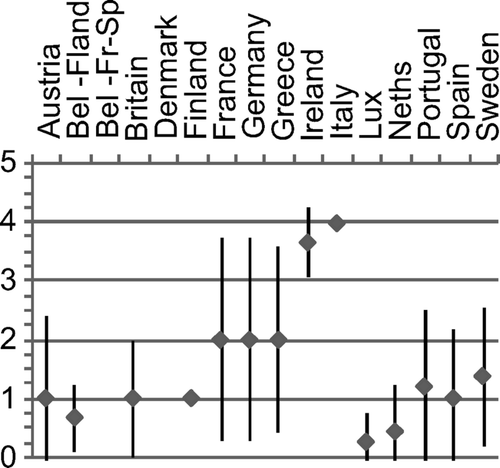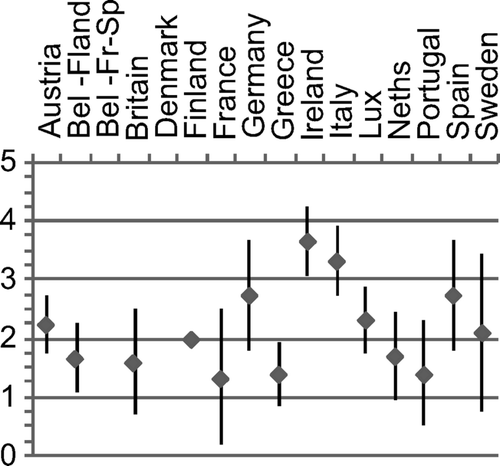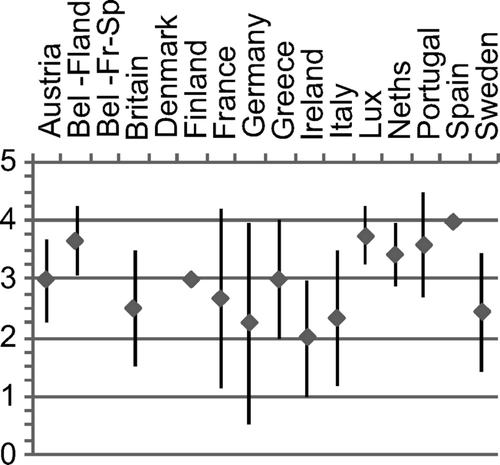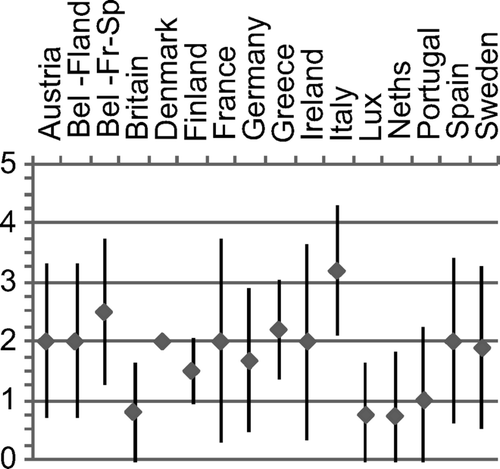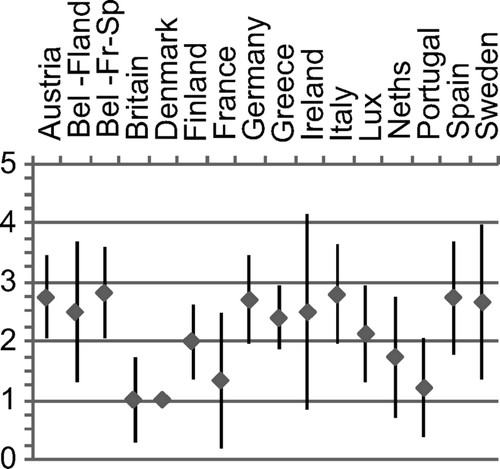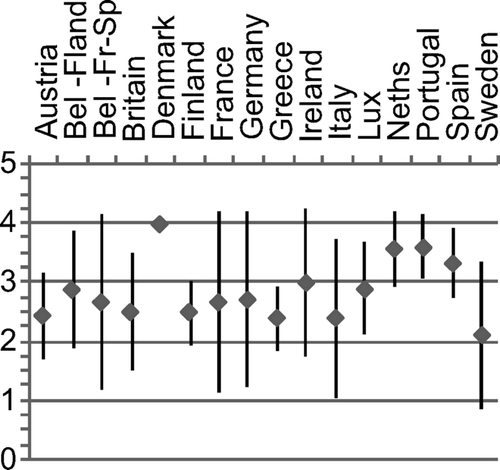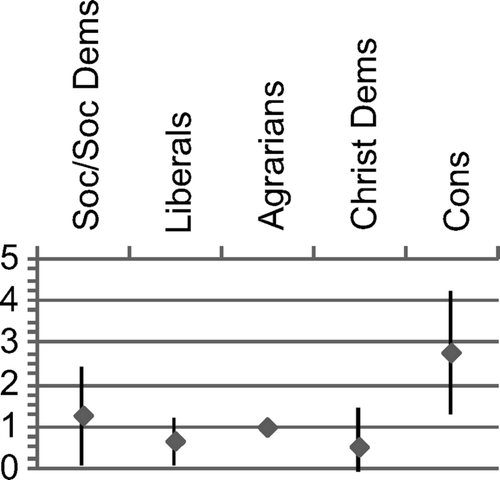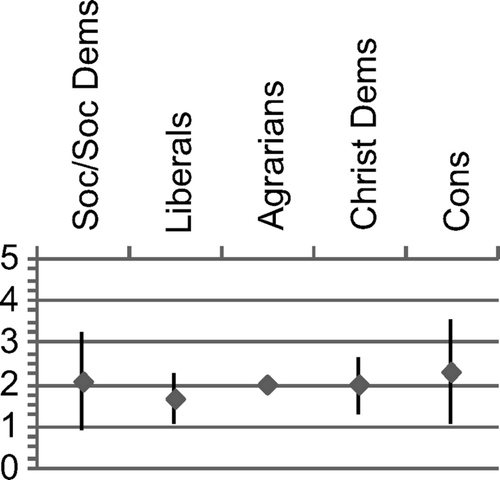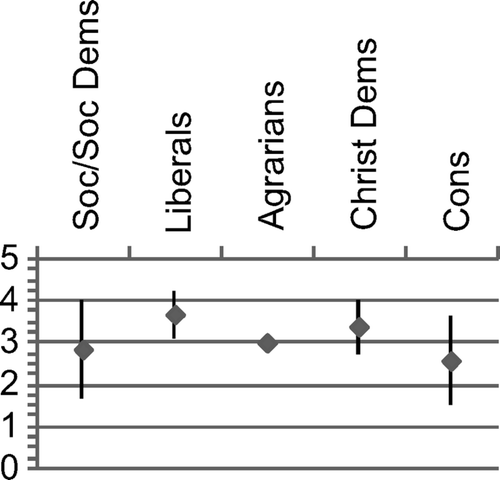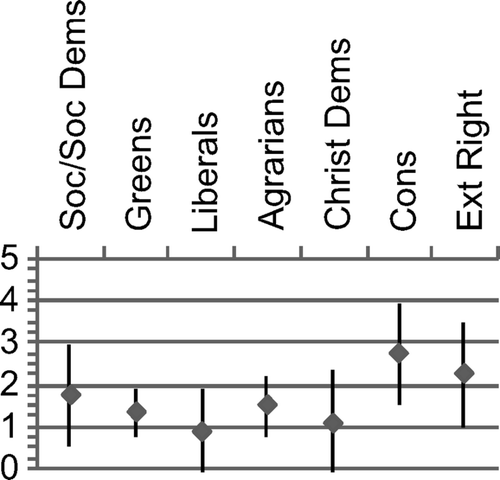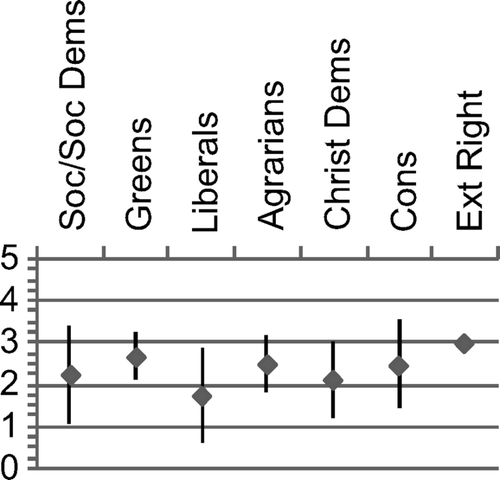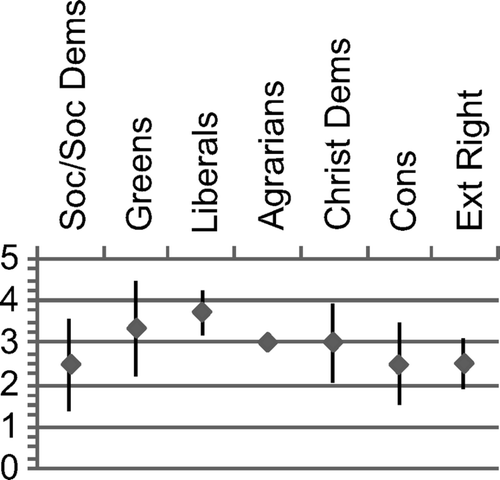Abstract
This article examines the impact of European integration on the balance of power within national political parties. It does this by drawing on the results of a survey of key actors in up to 55 parties in the 15 pre-2004 enlargement member states. The analyses show that, when they are involved in EU-level decision-making, party elites are relatively powerful vis-à-vis their national parties and that in a number of instances their intra-party power has also increased over time. National parties have, to some extent, attempted to constrain their elites but appear to be fighting a losing battle. Although there are some minor differences by country and by party, the empowerment of party elites is a general phenomenon. This research provides an empirical dimension to the existing research on the Europeanisation of national political parties and presents an important substantiation of the widely discussed democratic deficit that exists within the EU system of governance.
Over the past two decades the geographic coverage and the substantive scope of the European Union have increased significantly and the inherent nature of the EU's decision-making processes has changed considerably. Put differently, more countries are now legislating collaboratively, they are doing so in more policy areas, and they are making more and more use of qualified majority voting (QMV), a procedure which shifts decision-making from an intergovernmental to a supranational logic.
Not surprisingly, these developments have given rise to a vast literature that addresses the interaction between European integration and national institutions, actors and policies. Subsumed under the rather amorphous heading of ‘Europeanisation’ are several different research perspectives and analytical approaches (Olsen Citation2002) that focus on almost any conceivable aspect of change related to European integration (Featherstone Citation2003; Mair Citation2004). Despite the abundance of such studies however, we still have much to discover about the repercussions of ongoing European integration on political parties, even though all EU member states are, to a greater or lesser extent, party governments. In particular we know very little about the impact of integration on the distribution of power within national political parties. In light of this, this article sets out to examine whether and how the involvement of party elites in EU-level decision-making has changed the internal balance of power within national political parties. In addition to analysing overall trends, we investigate whether certain factors ‘filter’ the impact of European integration on the power relations within national parties and we thus explore whether differences exist between countries and between specific groups of parties.
European Integration, Democracy and Accountability
One important theme that has emerged from the Europeanisation research agenda is the concern with the so-called democratic deficit which is predicated on the observation that, by and large, executives have been strengthened at the expense of other domestic actors, particularly national legislatures, and that, at present and in spite of recent treaty amendments, the European Parliament remains relatively weak compared to other EU-level decision-making bodies.
This ‘executive bias’ inherent in European integration is explained by the mechanisms of EU-level decision-making, which privilege governmental actors, and by the logic of international negotiations, which militates against parliamentary control (Hix and Goetz Citation2000: 9–14; Moravcsik Citation1993; Raunio and Hix Citation2000; Weiler et al. Citation1995). More specifically, non-governmental domestic political actors, such as national (backbench) parliamentarians, are de facto excluded from EU decision-making since the decision-making arenas that do encompass domestic political actors (the European Council and the Council of Ministers) bring together heads of government and government ministers only. In addition, the capacity of non-governmental domestic actors to hold their ministers to account is constrained due to the fact that ministers require some degree of autonomy from their domestic bases if they are to negotiate and compromise in European arenas in such a way as to protect and maximise their national and/or partisan interests. The aggregate effect of this executive bias is then exacerbated as ever more policy competencies are transferred from the domestic to the European level.
But that is not all: ministers also benefit from informational asymmetries (Hix and Goetz Citation2000; Raunio Citation2002: 411). To use the principal–agent terminology, these asymmetries take the form of ‘hidden information’ and ‘hidden action’. That is, domestic actors ‘do not fully know the competencies or preferences of their agents [i.e. their ministers] or the exact demands of the task at hand’ and nor can they ‘fully observe the actions of their agents’ (Strøm Citation2000: 270; Citation2003: 61–2). Translated into the EU setting, this means that national legislatures and national parties are likely to have less information (a very valuable resource) about specific policies than their ministers who benefit from the expertise offered by national and EU-level bureaucracies. Domestic actors are thus less able to appreciate the intricacies of EU-level decision-making and the precise options open to their ministers, especially if decisions are reached under QMV. On top of this, their capacity to observe the actions of their ministers is constrained because European Council and Council of Ministers meetings are most often conducted behind closed doors. This practice not only excludes domestic principals from knowing how negotiations unfolded, but it also allows ministers to control the way in which outcomes are presented and justified. Ministers may of course pursue strategies that are fully acceptable to their domestic principals but, given these informational asymmetries, they may alternatively engage in so-called ‘exit strategies’ (Hix and Goetz Citation2000: 12–13), whereby they pursue outcomes at the EU level that would not have been possible to realise at the domestic level, claiming, if need be, that ‘Brussels made me do it’.
In recent years the question of executive bias has been addressed in particular by studies that have examined the ways in which national parliaments and parliamentarians have gradually reacted and adapted to growing European integration (e.g. Auel Citation2005; Auel and Benz Citation2005; Börzel and Sprungk Citation2007; Maurer and Wessels Citation2001; O'Brennan and Raunio Citation2007; Raunio and Hix Citation2000). There has, however, been little investigation into the consequences of this executive bias in the context of national political parties. Indeed, the fact that the impact of European integration on national parties has not been analysed in any great depth has been noted elsewhere (e.g. Mair Citation2006), and some work is now being done to remedy this situation (e.g. Ladrech Citation2002a; Poguntke et al. Citation2007). It is crucial that this gap be filled because political parties provide the essential linkage between government and electorates in modern parliamentary democracies (Lawson Citation1988; Poguntke Citation2002), and for this very reason they are key to the whole debate over the democratic deficit.
Furthermore, it is important to examine whether the executive bias produced by European-level decision-making is also reflected inside political parties, as well as to consider the consequences of this phenomenon because changes to the internal dynamics of political parties are likely to affect how the classic party goals of office, votes and policy are prioritised and pursued. If we find that, because of this executive bias, parties are no longer able to guide policy to the same extent as previously – that is, if we find that policy linkage is weakening – then it might be that all parties are able to do is control which elites they send to Europe. In other words, they may cease to be instruments that connect citizens to the substance of European politics and may instead increasingly serve as mere mechanisms of elite selection. And if this is so, these elites will have gained intra-party power because it is they, rather than their national parties, who are involved in EU-level decision-making, and because, once negotiations at the EU level are concluded, it is very difficult for national parties to reverse the decisions that have been made. Effectively, and more or less unilaterally, party elites may be able to alter their parties' positions on specific policies.
For these reasons this article examines the effect of European integration on the internal organisation of national political parties, and specifically investigates the power of party elites vis-à-vis their national parties in European-level decision-making, and the extent to which this power may have changed over the last decade or so. It does this by presenting and analysing the findings of a major, cross-national research project on the Europeanisation of national parties.Footnote1 As such, it adds an important empirical dimension to the few previous studies that have theorised about the Europeanisation of national political parties and about party elite empowerment (Ladrech Citation2002b, Citation2007; Poguntke et al. Citation2007; Raunio Citation2002, Citation2007).
Theoretical Framework and Operationalisation
The debate about the executive bias is concerned with alleged power shifts from parties and parliaments to party and governmental leaders. Hence, an investigation into the executive bias within political parties necessarily entails an examination of power. We conceptualise power in the Weberian tradition as the ability to achieve a desired outcome, even against resistance (Weber Citation1980: 28). This power can either flow from the autonomy to decide courses of action without outside interference or from the use of resources to overcome any resistance. As such, party politicians ‘who enjoy greater autonomy have a larger sphere of action in which they are protected from outside interference. To this extent they can effectively ignore other actors. Their overall power is, then, the combination of the scope of this protected area and their ability to use all their power resources to overcome potential resistance by others outside this protected area’ (Poguntke and Webb Citation2005a: 7).
Power is not a static quantity since it is subject to the dynamics of political struggles between those pursuing goals and those resisting them. In this case it is the outcome of the struggle between the power resources of individual party elites who are active in EU-level decision-making and the resistance that emanates from their national parties, embodied in ex ante and ex post control and accountability mechanisms and processes. Of course, we are very conscious of the fact that European integration is only one of several factors that may have led to a strengthening of party elite power, with other factors including the increasing personalisation of the electoral process, as well as the wider trends towards the ‘presidentialisation’ of politics (Bean and Mughan Citation1989; Kaase Citation1994; King Citation2002; Poguntke and Webb Citation2005b). We have therefore been very careful to devise a research design that focuses specifically on party elites active within EU-level arenas and that enables us to disentangle potentially interacting effects (see the section on data and measurement below).
The power struggle between party elites and national parties comes about because, in the core decision-making arenas of the EU, two fundamental logics conflict and need to be reconciled. On the one hand parties want to control the actions of members or heads of government (who are members of the elites of their party) in order to make sure that the eventual compromise reached at the EU level is as close as possible to the party's preferred policy – this is the essence of party government (Katz Citation1986). Yet, on the other hand, these elites need room for manoeuvre in their negotiations in order to achieve compromise. Thus, parties need to develop mechanisms to ensure that their elites are constrained from pursuing goals that are different from the party's without making it impossible for them to negotiate. In the language of principal–agent theory, they need to develop mechanisms to prevent agency loss (Müller Citation2000; Strøm Citation2000).
Parties can choose to narrow the room for manoeuvre of their elites before they enter into negotiations by issuing a clearly defined mandate. However, such ex ante instructions have inherent limits because too strict a mandate risks completely obstructing any meaningful negotiation. Thus parties may also choose to require ex post explanations from their governmental actors in which these actors are expected to account for why they settled for a specific compromise within the limits of the previous mandate, and to justify why a certain distance from the party's preferred solution was the maximum that could be accomplished at the negotiation table. If these ex post mechanisms are quite powerful, bargainers will feel more constrained in their negotiations. By contrast, they will perceive a fairly high degree of discretion if these mechanisms are mere formalities without serious consequences.
It is conceivable that parties may decide to apply only either ex ante or ex post procedures. In the first case, party elites will not be confronted with specific ex post procedures but they will still need to anticipate adverse reactions to specific decisions when they stand for re-election or re-nomination by their party. In other words, their specific actions in ‘Brussels’ will be subjected to generalised scrutiny in intra-party debates and substantial deviations from their party's programmatic stance will entail spending considerable amounts of political capital – something that may weaken their position in the long run. In the second case, parties will simply consider their general policy stances to be sufficiently specific to act as prior instructions. In this scenario, ex post explanations are employed to ensure that the actions of party elites are suitably congruent with party positions.
We operationalised our concept of party elite power by administering a questionnaire in which we asked party actors to estimate how much ‘discretion’ party elites active in EU-level decision-making have vis-à-vis their national parties (see below for further details of the questionnaire and respondents). At first sight this choice of terminology might appear a little odd given our earlier discussion of the Weberian concept of power. However, we were keen to avoid, as much as is possible, evaluations that are laden with normative considerations, or evaluations that rest on theoretical suppositions such as assertions that parliamentarians are solely answerable to their electorate and/or their conscience. We contend that the term ‘discretion’ is synonymous with room for manoeuvre and captures the perceived result of the struggle for power that takes place between party elites and their national parties.
This operationalisation also highlights that there is a distinction between objective and subjective power. After all, an individual's perception of power may be substantially misconceived. He or she might, for example, grossly underestimate the effectiveness of accountability mechanisms and find that his or her ability to pursue a certain outcome is curtailed to a much greater degree than was originally anticipated.
It is perhaps even questionable whether any attempt to measure objective power independent of specific pending decisions, that is, real political contests over concrete decisions, is either possible or meaningful. That said, for the purposes of this study, our main concern was to avoid narrow, subjective evaluations of elite power, and, to that end, we focused on the perceptions of several key actors in each party who, due to their long-term experience and their extensive knowledge of their parties' accountability mechanisms, were well placed to make intuitive calculations about the power of elites in their parties. We believe that this is the best and most meaningful way of approximating the objective power of party elites vis-à-vis their party organisations.
As well as measuring the power of party elites by investigating the discretion these actors enjoy vis-à-vis their parties when they partake in decision-making at the European level, we are also interested in the degree and effectiveness of accountability mechanisms that parties employ to control, constrain or oversee the actions of their elites. At first glance this may seem unnecessary as an actor's discretion level already takes into account the perceived constraints to which he or she is likely to be subjected. Yet, examining the extent to which accountability mechanisms (of both the ex ante and the ex post variety) are used within national parties allows us to observe whether party elites enjoy high levels of discretion in EU-level decision-making because few accountability mechanisms are used, or whether, alternatively, they enjoy high discretion even though these mechanisms are employed extensively. It also enables us to assess the relationship between changes in the discretion of party elites and changes in the use of accountability procedures.
We therefore asked party actors to estimate how much prior instruction elites receive from their party before they partake in decision-making at the EU level (thereby tapping the extent of ex ante accountability) and to estimate the extent to which these elites have to explain their actions to their party after decisions at the European level have been taken (ex post accountability).
The specific nature of these accountability mechanisms and procedures are of secondary importance to us since, above all, we are interested in their effectiveness and in the extent to which they constrain the ability of party elites to negotiate in an unhindered fashion. That said, ex ante mechanisms include regular discussions on pending EU decisions within a party's national executive or executive committee, which will inevitably narrow the scope for manoeuvre of those who will subsequently participate in EU-level negotiations. Formal decisions over guidelines are another, more effective example of ex ante procedures. Likewise, ex post procedures may simply take the form of a report. Alternatively, they may involve a requirement for party elites to undergo more formal sanctioning procedures (for more details see Müller Citation2000: 322–9).
We should also point out that, since our focus is squarely on the mechanisms and procedures within political parties, we are not concerned with external scrutiny arrangements and institutions such as parliamentary EU Affairs Committees; nor are we interested in the ways that (coalition) governments may try to ensure that their members toe the government line when they are active in EU negotiations. Rather, the accountability mechanisms and procedures that matter here are those found in the various organs of party leadership bodies, although the party on the ground may also attempt to hold elites accountable, albeit normally with less regularity or effectiveness.
Having sketched out our theoretical framework and having explained how we operationalise our concepts we are now in a position to turn to our hypotheses. In the first instance, given the executive bias inherent in EU-level decision-making, we hypothesise that party elites will enjoy high levels of discretion when they are active at the European level. Secondly, since these elites require a certain room for manoeuvre in their negotiations, and since they benefit from considerable informational asymmetries, we anticipate that national parties will only make moderate use of ex ante and ex post accountability mechanisms. In other words, we expect that national parties will only attempt to control their ministers to a certain extent because they will appreciate that ministers require sufficient room for manoeuvre so as to strike deals at the EU level, and because they (national parties) will have imperfect knowledge of the dynamics of the negotiations (i.e. they will suffer from ‘hidden information’) and will be unable to observe these negotiations (i.e. they will be disadvantaged by ‘hidden action’).
In addition to measuring current levels of party elite discretion and the current usage of accountability mechanisms, we are interested in how the executive bias might have influenced intra-party power over time. Since increased European integration has meant that ever more policy competencies are being transferred from the domestic to the EU level, and since QMV is increasingly used in the Council of Ministers – a practice that requires ministers to be accorded greater leeway to compromise and strike deals with their counterparts from other countries – we would expect that the discretion enjoyed by party elites in European-level decision-making will have increased over the last ten years or so. And, for the same reasons, we would expect to see national political parties attempting to claw back some of their lost influence by making greater use of ex ante and ex post accountability mechanisms.
We therefore hypothesise the following:
H1. Party elites active in EU-level decision-making arenas will enjoy high levels of discretion vis-à-vis their national parties. | |||||
H2. National parties will make moderate use of ex ante and ex post accountability mechanisms to control and oversee the actions of their elites in EU-level decision-making fora. | |||||
H3. The discretion of party elites active in EU-level decision-making arenas vis-à-vis their national parties will have increased over time. | |||||
H4. Over time national parties will have made increased use of ex ante and ex post accountability mechanisms to oversee the activities of their elites in European-level decision-making arenas. | |||||
Secondly, the accountability and discretion of party elites active in EU-level arenas might vary by party family since different ideological traditions have left their marks on the way parties organise. Working class parties, to use the classic example, entered the political world with the ideal of a strong extra-parliamentary party guiding the actions of their elites in parliament and government, and this is likely to be still visible today. Liberal and Conservative parties, by contrast, typically originated from within parliaments and developed an organisational culture in which parliamentary elites dominated the extra-parliamentary party (LaPalombara and Weiner Citation1990; Neumann Citation1956) although in the case of Conservative parties, this predisposition might well be cancelled out by the strong emphasis that these parties tend to place on the role of the nation state. We therefore expect to see some variation in the discretion of party elites according to party family.
The way in which the issue of European integration is managed is not only likely to vary across countries and party families; it may also be handled differently across individual parties. In the first instance, the individual parties' stances on European integration are likely to matter. Parties that are against (further) European integration may well grant their elites less discretion in EU-level decision-making and may be more prepared to make extensive use of accountability mechanisms than parties that favour (further) integration. The importance parties attach to the issue of European integration is also likely to be relevant. Parties that judge integration to be of great importance and that present the issue in a salient way in their public stances are more likely to hold their elites to account and to curtail their discretion than parties that consider integration to be of little or no importance and that fail to discuss the matter in their stances. Finally, we would also expect parties that are internally divided over European integration to make greater use of accountability mechanisms and to allow their elites less discretion than parties that are united over this issue.
Of course, the effects of these intervening variables might cancel each other out to some degree. In view of this, we do not advance explicit hypotheses here, but rather content ourselves with exploring interesting patterns. Furthermore, our expectations as to the power of the intervening variables also remain modest for the simple reason that the ability of individual parties to constrain the actions of their elites is necessarily limited if these elites are to be able to negotiate meaningfully in EU-level arenas.
Data and Measurement
We were able to measure the discretion of party actors active in EU-level decision-making as well as the effectiveness of ex ante and ex post accountability mechanisms by making use of data derived from a questionnaire that was specifically designed for this purpose. Thanks to an international team of political scientists, this questionnaire was translated into all relevant languages and was administered, by post, to party actors in all 15 pre-2004 enlargement EU member states (with Flanders and French-speaking Belgium treated as two separate cases). Questionnaires were sent out between November 2004 and summer 2005.Footnote2 An English copy of the questionnaire can be found on the website of the UK Data Archive (http://www.data-archive.ac.uk/).
Questionnaires were sent to key party actors in virtually all relevant parties. More specifically, the following actors were targeted: the head MEP; parliamentary party leader; extra-parliamentary party leader; party manager/general secretary; senior politicians with an EU brief; senior member of the national parliamentary EU Affairs Committee; and international/European secretary. Clearly, the names of these positions vary widely between and within countries and so we used definitions of functional equivalence to ensure comparability (Poguntke Citation1998; van Deth Citation1998). In some cases questionnaires were also sent to (recent) previous holders of the above positions and to a number of other actors, such as other influential MEPs, other influential party staff members with an EU brief, and influential party actors in Europarties. All these actors were targeted because of their expertise and in-depth knowledge of their party's organisation, both as a whole and with specific reference to European activities. In all we received completed questionnaires from 334 party actors from 86 parties in all 15 countries.Footnote3
The questions asked respondents for information and views on the internal workings of their parties and on the effect of European integration on these internal dynamics. The vast majority of the questions centred on the role, involvement and influence of various actors within their party. As such, respondents were not asked about their own specific role or function, but were instead asked to provide an expert judgement on various aspects of their party's organisation. The questionnaire asked respondents for judgements about the current (i.e. 2004/05) situation and about the extent to which intra-party politics had changed over time, specifically over the last decade. We chose to ask about changes over the last ten years as we felt this time period was long enough to track meaningful changes in party organisation and, at the same time, it seemed reasonable to expect respondents to recollect changes over such a period.
The analyses below focus on only a subset of the questions asked in the questionnaire, namely on those that asked respondents about how much discretion party elites enjoy when they are active in the European Council and Council of Ministers, how much prior instruction they receive from their party when they operate in these fora (i.e. ex ante accountability), how much explanation for their actions they need to give to their party once they return from these meetings (i.e. ex post accountability), and how much change there has been in these levels over the last ten years (the precise questions and answer categories are replicated in the Appendix). These questions thus refer directly and specifically to the effects of party elite involvement in EU-level arenas, and thereby enable us to largely exclude the impact of other potential sources of shifts in intra-party power relations.
Clearly these questions were only relevant to parties that were represented in the European Council and/or the Council of Ministers at the time the questionnaires were administered and/or during the ten years prior to that time. To take account of this, the questionnaires included a ‘Not Applicable’ answer category. Out of the 86 parties from which we received completed questionnaires, 55 were represented in the European Council and/or the Council of Ministers during the time period under study. The analyses that follow focus on the questionnaires that were returned from these 55 parties, with each individual questionnaire from these parties constituting one unit of analysis.
In the analyses below, we focus first on the general trends in the discretion and accountability of party elites active in the European Council and the Council of Ministers. We have chosen to consider all our respondents' answers at once because multiple office-holding is so frequent among our respondents that it becomes impossible to disaggregate our data by type of respondent. For instance, so many of our respondents hold or have held positions in both national party politics and supranational party politics that distinguishing between these two categories of respondent proves impossible.Footnote4
Our investigation into general trends in discretion and accountability is followed by an examination of the importance of three sets of intervening variables mentioned above, namely country, party family, and the ways in which parties have handled the issue of European integration. To do this, we grouped our parties into eight different party families: extreme left/communists; Socialists/Social Democrats/Labour; Greens; Liberals; Agrarians; Christian Democrats; Conservatives; and extreme right. We explored whether discretion and accountability levels are in any way affected by i) the position of the party leaderships on European integration, ii) the salience of integration in the parties' stances, and iii) the extent to which parties are internally divided over European integration. We were able to do this by making use of the 2002 Chapel Hill dataset, which covers all our countries with the exception of Luxembourg (see http://www.unc.edu/∼hooghe/parties.htm).
We explore patterns by country and party family by calculating the mean responses of party actors from the different countries or party families, as well as the standard deviations of these responses, and we report these in graphical form. We do not engage in multiple regression analysis in this instance because we are not attributing causation. In other words, while we are interested in patterns across countries and parties, we are not going so far as to predict that belonging to a certain country or party family is likely to cause party elites to have a specific level of discretion or accountability. And for these very reasons, when we consider whether discretion and accountability vary according to the party leaderships' attitude towards European integration, or to the salience of integration in their stances or to the level of internal party dissent over integration, we content ourselves with exploring measures of association only.
The Balance of Intra-party Power: Evidence from 15 Countries
We have argued above that involvement in EU politics will enhance the intra-party power of national party elites because these actors need a reasonable degree of discretion in EU-level decision-making if they are to negotiate meaningfully. At the same time, the very logic of party government suggests that national parties are unlikely to grant their elites a completely free rein and so we expect party elites to be subjected to a moderate degree of ex ante and ex post accountability. Furthermore, because the competencies of the EU have grown over time, we anticipate that the intra-party power of party elites will have increased but we also expect national parties to have attempted to counteract such trends through the increased use of accountability mechanisms and procedures. The following sections examine whether these expectations are borne out in practice. We first focus on the current (i.e. 2004/05) situation before moving on to explore changes over time.
Accountability and Discretion of Party Elites
In the first instance we can see from that parties in the EU-15 states have clearly not been going out of their way to limit their elites' room for manoeuvre in EU-level decision-making arenas by issuing them with high levels of prior instruction. Indeed, approximately one-third of all respondents across our 55 parties reported that their elites receive no prior instruction at all from their parties and about one-quarter of respondents indicated that their elites receive only modest levels of prior instruction (score of 1). Put differently, we see that over half of our respondents claimed that their elites are not issued with extensive prior instruction (scores of 0 and 1). By contrast, very few respondents maintained that their elites receive a high degree of prior instruction when they are active in EU-level decision-making arenas.
TABLE 1
ACCOUNTABILITY AND DISCRETION OF PARTY ELITES IN EU DECISION-MAKING
Concerning the ex post explanations parties require of their EU-level actors, we can see from that few respondents reported that no ex post explanation is required. Rather, and as we expected, the vast majority of respondents indicated that party elites have to explain their actions to a moderate extent (scores of 1, 2 or 3). By contrast, and in reflection of the political realism of national parties, extensive ex post explanation requirements are infrequent: only 10 per cent of respondents claimed party elites in the European Council have to provide full explanations of their actions, and only one in eight respondents said the same with regard to elites in the Council of Ministers.
Lastly, shows our respondents' estimations of the discretion of party elites active in EU-level decision-making arenas. We can observe that the vast majority of respondents (around three-quarters) indicated that party elites enjoy high levels of discretion (scores 3 or 4), and that very few reported that elites have no discretion while engaged in negotiations in EU-level arenas.
It is particularly interesting to consider our respondents' answers on this ‘discretion’ question alongside their answers about levels of prior instruction and ex post explanation because at first sight we appear to be confronted with a puzzle: we might have expected high levels of discretion to be accompanied by low levels of prior instruction and ex post explanation but in fact we find that the patterns are more complex than this. Indeed, as we can see in , the proportion of respondents who reported that party elites have a fairly or very high degree of discretion (scores 3 and 4) is considerably higher than the proportion of respondents who reported that there is little or no use of ex ante or ex post accountability mechanisms and procedures.
TABLE 2
KEY TRENDS IN ACCOUNTABILITY AND DISCRETION OF PARTY ELITES IN EU DECISION-MAKING
It therefore appears that party elites may enjoy high levels of discretion in EU decision-making arenas in spite of their parties attempting to constrain their actions in some way, be it before the negotiations or after. This demonstrates that the discretion that party elites enjoy in EU-level negotiations and decision-making is not simply the sum of the constraints that come from prior instructions and ex post explanations. Rather, it is the outcome of a complex combination of anticipated effects of specific actions and explicit instructions. In other words, even if a party actor is issued with a fairly well-defined mandate, he or she still needs to calculate the actual room for manoeuvre that is available. This means that the degree of discretion reported in and reflects the real effect of the political process within parties of which these procedures are simply important elements.
These results clearly indicate that there are inherent limits to how much parties can influence the behaviour of their elites in EU politics. In this sense, party elites appear to have considerable power vis-à-vis their party. This represents an important empirical confirmation of the executive bias and also suggests that the very nature of EU decision-making undermines the logic of party government which requires a reasonably close linkage between what parties want and what elites do (Katz Citation1986: 42–6). Furthermore, these findings raise serious questions about the democratic accountability of party elites operating in EU-level arenas.
Change over Time
As regards trends over time, we expected the degree of change in accountability and discretion to be rather modest because the period in question is relatively short and, more importantly, because party organisations have a certain inbuilt inertia, which means that any adaptation is likely to lag considerably behind relevant changes in their organisational environment (Harmel Citation2002: 119; Harmel and Janda Citation1994). In other words, the natural tendency of organisations to resist change is likely to mean that, despite quite substantial changes within the EU, parties will not have implemented dramatic changes.
By and large, our expectations are borne out. The data in show that a majority of respondents indicated that there has been no change in the levels of prior instruction issued by parties to their elites active at the EU level, in the ex post explanation requirements, and in the overall level of discretion enjoyed by these actors.
TABLE 3
CHANGES IN ACCOUNTABILITY AND DISCRETION OF PARTY ELITES IN EU DECISION-MAKING
Among those respondents who did indicate changes in these indicators, we see that very few reported that parties have reduced their attempts to constrain their actors. This clearly indicates that national political parties have not been willing to give their political elites more room for manoeuvre in EU politics. More respondents indicated that parties have, to some extent, attempted to rein in their elites. shows 26.0 per cent of respondents claimed that parties now issue more prior instruction to their elites in the European Council (scores of 1, 2, 3 or 4), and 26.1 per cent reported more prior instruction to members of the Council of Ministers as compared to ten years ago. Similarly, indicates that as many as 47.2 per cent of respondents indicated that elites in the European Council now have to explain their actions to a greater degree than ten years ago, and 40.2 per cent reported more ex post explanation for members of the Council of Ministers.
The fact that more respondents reported increases in ex post explanation than in prior instruction is noteworthy in as much as it supports the argument we made earlier about there being inherent limits to a national party's ability to issue clearly defined mandates to their elites before negotiations at the EU level begin. That said, we should also recognise that, of the respondents who did report an increase in the use of accountability mechanisms, most indicated that this was modest (i.e. scores of 1 and 2) rather than high (scores of 3 and 4). This suggests that parties have remained realistic about the extent to which they may be able to constrain their elites in EU decision-making.
As for the level of discretion of party elites, where respondents did indicate that change has taken place, very few reported that elites now have less discretion as compared to ten years ago (see ). By contrast, about a quarter of respondents reported that actors in the European Council and the Council of Ministers now enjoyed more discretion than they did ten years ago.
We may therefore conclude that, although the strongest finding to emerge from is one of no change over time, when change was reported, the trends point once again to a paradox: there have been more reports of increases in levels of prior instruction and ex post explanation than there have decreases, and yet our respondents also indicated more instances of rises in discretion levels than of falls. This suggests that national political parties are, to a degree, fighting a losing battle when it comes to trying to keep control of their elites in EU decision-making. It also provides considerable evidence to indicate that party elites have indeed tended to gain power vis-à-vis their national parties as a result of increased European integration. What is more, this conclusion is supported by the answers to another question contained in our questionnaire, which was designed to directly connect the power of each party's leader to the effect of European integration. When asked ‘how has European integration directly affected the amount of political power exercised within your party by the party leader’, 31.9 per cent of respondents from parties with governmental experience reported that European integration had increased the party leader's power, whereas only 5.1 per cent stated that the party leader's power had declined.
Uniform Patterns or Differences between Countries and Parties?
As we pointed out above, the discretion and accountability of party elites engaged in EU-level decision-making might, in principle, vary according to national contexts and party characteristics. We proposed that the nature of the debate over European integration in each specific country may well affect the discretion and accountability of party elites active at the EU level. We also suggested that parties from different ideological traditions might accord their elites more or less discretion, and hold them more or less accountable for their actions in European decision-making arenas. Lastly, we proposed that the way European integration, as a political issue, is perceived and handled within each party might also inform how much accountability elites are subjected to by their national parties and how much discretion they enjoy when they partake in negotiations at the EU level.
illustrate levels of prior instruction, ex post explanation and discretion of senior politicians in both the European Council and the Council of Ministers by country at the time our questionnaires were administered. The point on each bar represents the mean value, while the bars illustrate the standard deviations of the answers. Since the number of respondents from each country is relatively small (not least because these questions pertain to governmental parties only) the figures should be interpreted with care. That said, the graphs do show some interesting patterns. More specifically, they illustrate that there is considerable variation in the discretion and accountability of politicians active in both these arenas.
Two countries that do stand out in some respects are Italy and Ireland. Italian politicians in both arenas receive the highest levels of prior instruction from their national parties, are required to provide relatively full explanations for their actions, and have relatively low levels of discretion. Similarly, Irish members of the European Council, when compared to their counterparts from other member states, are issued with high levels of prior instruction, are required to provide considerable explanation after the negotiations, and have low levels of discretion. Interestingly, however, Irish politicians in the Council of Ministers appear subject to less accountability from their national parties and enjoy high levels of discretion.
Elsewhere, and despite some variation, the accountability and discretion of party elites active in EU-level decision-making arenas are in line with the general patterns described in the previous section of this article. That is, on the whole, these party elites receive low to moderate levels of prior instruction from their national parties, are required to explain their actions to their national parties to a moderate extent, and enjoy moderate to high levels of discretion.
When we consider the extent to which the accountability and discretion of party elites have changed over time, we find very few differences across countries and even fewer outliers, and for these reasons we have chosen not to provide graphs for these data. The only real outlier is Italy, where levels of prior instruction issued to elites active in the European Council have increased more than in other member states over the ten years under study: the mean for Italy is 2.25, whereas the mean values for other countries range from −0.17 to 0.75. Yet, somewhat counter-intuitively, greater prior instruction is not accompanied by lower levels of discretion: although they are now issued with more prior instruction, Italian elites in the European Council actually enjoy higher levels of discretion than they used to. Italian elites in the Council of Ministers have seen their levels of accountability and discretion change over these ten years too, but not in a way that is markedly different to their counterparts from other countries.
As regards differences between party families, show that Conservative politicians in both the European Council and the Council of Ministers receive the highest levels of prior instruction from their national parties. That said, the amount of explanation that they must provide to their national parties after negotiations and the discretion they enjoy when active in these arenas is not very different to that of politicians from other parties. The figures also illustrate that Liberal politicians receive relatively low levels of prior instruction from their national parties, are required to provide the least ex post explanation on their return from negotiations in the European Council and Council of Ministers, and enjoy the highest levels of discretion. These patterns are in line with our expectations in that they appear to reflect the traditional dominance of elites within Liberal parties, but the differences between party families are relatively small.
None of the main party families stands out from the others when we consider whether and how the accountability and discretion of party elites have changed over time.Footnote5 For this reason we have chosen, once again, to do without any graphical illustration. Across all the large party families, general trends are confirmed: there have been slight increases in the prior instruction issued to party elites active in the two EU-level arenas and there have been increases in the amount of explanation that they are required to provide. At the same time though, the discretion of party elites in the European Council and Council of Ministers has also increased a little over time.
In addition to illustrating patterns by party family and by country, we examined whether the accountability and discretion of party elites engaged in EU-level decision-making are in any way linked to the attitudes of individual parties towards European integration, the salience of integration in their stances, and the extent to which they are internally divided over the issue of integration. Our results are shown in , and they paint a mixed picture.Footnote6
TABLE 4
THE RELATIONSHIP BETWEEN THE ACCOUNTABILITY AND DISCRETION OF PARTY ELITES AND HOW PARTIES MANAGE EUROPEAN INTEGRATION
does indicate that, as we had predicted, there is a statistically significant relationship (albeit a relatively weak one) between the attitudes of the party leaderships towards European integration and the amount of discretion accorded to elites active in the European Council: the more strongly party leaderships favour integration, the greater the discretion of their elites in the European Council. However, we found no link between the party leaderships' attitudes towards integration and the discretion accorded to members of the Council of Ministers, and neither did we find any meaningful relationships between the attitudes of the leaderships towards integration and the amount of prior instruction issued to party elites in either arena or the level of ex post explanation required of them. We also found that the salience of European integration in the parties' stances was not significantly related to the levels of accountability and discretion of elites in either of our two arenas.
By contrast, our analyses did reveal some meaningful relationships between the levels of internal party dissent over European integration and the accountability and discretion of elites active in the European Council and the Council of Ministers. As we had expected, we found that the greater the level of internal party dissent over integration, the greater the levels of prior instruction issued to elites in both our arenas. We also saw that the more internally divided the parties are over integration, the less discretion their elites are accorded when active in EU-level decision-making fora. Again, however, the correlations are relatively weak.
We found few meaningful relationships between these three intervening variables and the degree of change in the accountability and discretion of party elites in the two EU-level arenas over time. As illustrates, changes in levels of accountability and discretion were in no way linked to the attitudes of individual parties towards European integration. By contrast, we did find that parties that consider integration to be important had increased the amount of prior instruction issued to their elites in the European Council, although we must acknowledge the correlation coefficient is weak. Somewhat counter-intuitively, we also found that parties that consider integration to be important have accorded their elites in the Council of Ministers greater levels of discretion in the course of the ten years under consideration. Finally, as regards levels of internal party dissent over integration, we only uncovered one statistically significant relationship: we found, as expected, that the more divided the parties were over integration, the more the parties had curtailed the discretion of their elites in the European Council.
TABLE 5
THE RELATIONSHIP BETWEEN CHANGE IN THE ACCOUNTABILITY AND DISCRETION OF PARTY ELITES AND HOW PARTIES MANAGE EUROPEAN INTEGRATION
Our investigations into whether there is variation in the discretion and accountability of party elites engaged in EU-level decision-making across countries and type of party have highlighted a few interesting patterns. There have been some ad hoc country patterns (namely in Italy and Ireland), and there have been some differences across party families (notably as regards the Conservatives and the Liberals). In addition, we have seen that parties that favour European integration are more likely to accord their elites in the European Council greater levels of discretion, and we have observed that elites from parties that suffer from internal dissent over integration have tended to receive more prior instruction and to be accorded less discretion than their counterparts from other parties.
In spite of these few country and party differences, however, the overall picture remains very much characterised by the general patterns we discussed above. That is, in the overwhelming majority of cases, national political parties have attempted to constrain their elites active in EU-level decision-making to some degree by issuing them with limited prior instruction and by requiring them to explain their actions to a moderate extent after the negotiations have taken place. However, despite these efforts, elites have enjoyed high levels of discretion while ‘in Brussels’. Furthermore, the same game has been played out over time: national parties have increased their attempts to constrain their elites by issuing more prior instruction and by requiring more ex post explanation, and yet, party elites have enjoyed increasing levels of discretion in their European-level negotiations.
Conclusion
We started out with the suggestion that European integration is likely to have had significant consequences for the balance of power within national political parties. More specifically, we argued that because party elites need to be able to meaningfully negotiate when they partake in decision-making at the EU level, they are likely to enjoy considerable discretion vis-à-vis their national parties. Furthermore, we suggested that the intra-party power of party elites is likely to have increased over time given the growing competencies of the EU and the more widespread use of QMV.
We have explored these questions by drawing on the results of a large-scale mail survey of virtually all relevant parties in the EU-15. Of course, as with any study of this kind, the data do have some limitations. Most notably, we had to remain keenly aware of the large number of intervening variables that might potentially influence specific patterns of intra-party power in individual parties and/or countries. That said, the study generated an impressive data set, and, crucially, the conclusions we have reached here are consistent with those we came to when we examined the issue of elite empowerment by conducting some 150 in-depth interviews with key political actors in six of the old EU member states (Poguntke et al. Citation2007).
The results of our analysis were consistent with our theoretical expectations. We found that party elites do enjoy considerable discretion vis-à-vis their national parties when they are engaged in decision-making in EU arenas. What is more, they appear to do so even though national parties have, to some extent, attempted to constrain the actions of their elites by employing mechanisms of ex ante and ex post accountability. Our data also show that, while the discretion that party elites enjoy in EU-level decision-making has only changed over time in a minority of parties, where it has changed, it has tended to increase. Again, though, where this has happened, national parties have also made increased use of accountability mechanisms and procedures.
Our intervening variables pointed to some slight variation in the accountability and discretion of elites across different countries and parties, and in the extent to which accountability and discretion levels have changed over the last ten years. However, while these patterns were interesting, some of them were rather idiosyncratic, and our correlations were often rather weak. Indeed, the story to emerge from our investigations into country and party differences is that variations to the overall trend are infrequent and slight, and that the overall patterns of party elite empowerment just described hold for the overwhelming majority of cases.
These trends suggest that national parties are finding it increasingly difficult to keep up with the speed of ongoing European integration which sees national party elites active in ever more decision-making. But this is not because national parties are inept or even oblivious to these developments. Rather it is because they are caught between a rock and a hard place: they recognise that party elites need to be given sufficient room for manoeuvre in order to negotiate meaningfully in Brussels, and yet the organisational structures of political parties demand that elites are held accountable to national party bodies. National parties therefore continue to try to hold their elites to account, and have even become more demanding of their elites, and yet, due to the logic of international negotiations and to the growing competencies of the EU, their increased use of accountability mechanisms has not been effective in limiting the discretion of party elites.
The parties' recognition of their elites' need for latitude in European Council or Council of Ministers meetings is reflected in the fact that parties have tended to make more use of ex post accountability mechanisms than ex ante ones. Parties appreciate that there is little point in constraining their elites in advance of EU-level negotiations as this would only tie the hands of their leaders. In short, they acknowledge that there are inherent limits to ex ante accountability mechanisms. They have therefore tended to ask for more explanation or more reporting from their elites once the negotiations have closed. This course of action has very real limitations for national parties, however, because once decisions have been made at the EU level there are few sanctions that can be applied to ‘uncooperative’ party elites and, of the ones that do exist, some are rather risky. After all, the political costs of disowning a member of the party elite are very high. It seems, therefore, that ex post accountability mechanisms also have their limits.
The limited effectiveness of ex ante and ex post accountability mechanisms thus explains why party elites continue to enjoy high levels of discretion when they are active at the EU level, and why, in some cases, their discretion has even increased. But the ineffectiveness of these mechanisms is not the only reason for their growing discretion. Rather, because the EU is acquiring ever more competencies, party elites are able to use their discretion in more and more policy areas. Put differently, as well as enjoying high levels of discretion because of ineffectual intra-party accountability mechanisms, party elites also gain discretion by ‘default’.
The interaction of these two dynamics both enlarges the ‘zones of autonomy’ of party elites and means that these elites are furnished with ever more valuable informational resources which they can deploy to overcome potential intra-party dissent back home. Therefore, and given our conceptualisation of power as a ‘combination of the scope of [a] protected area and [the] ability to use all power resources to overcome potential resistance by others outside this area’ (Poguntke and Webb Citation2005a: 7), we can conclude that the logic of international negotiations and the growth of European integration have led to party elites gaining power at the expense of party bodies such as party executives, parliamentary parties and party congresses. In real terms, these bodies now have to contend with the fact that the party's position on more and more policy issues is being determined by the binding decisions their elites make in EU-level arenas.
These findings have important consequences. They indicate that there are inherent limits to the extent to which parties can influence the behaviour of their elites in EU politics. In turn, this implies that the policy-making role of national parties is gradually being eroded, and that parties appear reduced to serving as mere gatekeepers of elite selection in EU governance. All this undermines the logic of party government and points to the weakening of policy linkage, a development that has important implications for the quality and the accountability of democracy within the EU. It also suggests that the debate about the democratic deficit certainly does have empirical substance.
Acknowledgements
We are very grateful to all our colleagues who translated and administered the questionnaire on which this article draws, and we would like to thank them for all their hard work. In addition, we would like to thank Gemma Loomes for collating the data, and Laura Morales and Kai Arzheimer for valuable advice and suggestions on earlier versions of this article. We are also grateful to the two anonymous reviewers and the editors of this journal for their helpful comments. Of course, the usual disclaimer applies.
Notes
1. This project, entitled ‘The Europeanization of National Political Parties’, was funded by the British Economic and Social Research Council (grant no. R000 23 9793) and supported by the Keele Research Investment Scheme of Keele University and the Spanish Ministry of Education and Science (Acción Especial SEC2002-11872-E).
2. Due to the early general election of 2005, some of the German questionnaires were not administered until late 2005.
3. Since we were essentially asking key party actors for their expert judgement on aspects of their party's organisation, we did not target a clearly defined sample of respondents, but instead we sent our questionnaire to the most senior party actors first, and we then worked out way down the ‘food chain’ in order to collect sufficient data to render our results valid and reliable. Given this, we are not in a position to report precise response rates although we can state that between 40 per cent and 70 per cent of party actors who were asked to complete a questionnaire did so.
4. Although this inability to disaggregate our respondents means we might be blind to some slight nuances in their answers, the fact that so many of our respondents hold or have held multiple offices is actually advantageous in that their intimate knowledge of several party arenas strengthens the validity of our data.
5. Respondents from the one agrarian party represented in EU-level arenas (the rather unique Finnish Centre Party – KESK) and respondents from the more extreme party families do report changes in accountability and discretion levels that stand out somewhat from the general trends. There have been greater increases in the use of ex post accountability mechanisms within KESK (in relation to elites active in both the European Council and the Council of Ministers) than there have been in other parties, but yet, elites from KESK have enjoyed greater increases in discretion in both EU arenas than have their counterparts from other parties. By contrast, elites in the Council of Ministers who belong to the Austrian Freedom Party (FPÖ) – the only extreme right party under observation – have experienced greater increases in prior instruction than have elites from other parties. Finally, and unlike their counterparts in all other parties, elites from the one extreme left party represented in the Council of Ministers over the time period (the Finnish Left Alliance – VAS) are now issued with less prior instruction and are required to provide less ex post explanation for their actions today as compared to ten years ago. However, they also enjoy less discretion today than they did ten years ago.
6. Since the data on accountability and discretion and the data on the parties' attitudes to integration, the salience of integration in their stances, and the level of internal party dissent are all measured at the ordinal level, and since there are a large number of tied ranks in the dataset, for our correlations we use Kendall's tau.
References
- Auel , Katrin . 2005 . ‘Introduction: The Europeanisation of Parliamentary Democracy’ . Journal of Legislative Studies , 11 ( 3/4 ) : 303 – 18 .
- Auel , Katrin and Benz , Arthur . 2005 . ‘The Politics of Adaptation: The Europeanisation of National Parliamentary Systems’ . Journal of Legislative Studies , 11 ( 3/4 ) : 372 – 93 .
- Aylott , Nicholas . 2002 . ‘Let's Discuss This Later: Party Responses to Euro-Division in Scandinavia’ . Party Politics , 8 ( 4 ) : 441 – 62 .
- Bean , Clive and Mughan , Anthony . 1989 . ‘Leadership Effects in Parliamentary Elections in Australia and Britain’ . American Political Science Review , 83 ( 4 ) : 1165 – 79 .
- Börzel , Tanja A. and Sprungk , Carina . 2007 . “ ‘Undermining Democratic Governance in the Member States? The Europeanization of National Decision-Making’ ” . In Democratic Governance and European Integration: Linking Societal and State Processes of Democracy , Edited by: Holzhacker , Ronald and Albæk , Erik . 113 – 36 . Cheltenham : Edward Elgar .
- Featherstone , Kevin . 2003 . “ ‘Introduction: In the Name of “Europe”’ ” . In The Politics of Europeanization , Edited by: Featherstone , Kevin and Radaelli , Claudio . 3 – 26 . Oxford : Oxford University Press .
- Harmel , Robert . 2002 . “ ‘Party Organizational Change: Competing Explanations?’ ” . In Political Parties in the New Europe: Political and Analytical Challenges , Edited by: Richard Luther , Kurt and Müller-Rommel , Ferdinand . 119 – 42 . Oxford : Oxford University Press .
- Harmel , Robert and Janda , Kenneth . 1994 . ‘An Integrated Theory of Party Goals and Party Change’ . Journal of Theoretical Politics , 6 ( 4 ) : 259 – 87 .
- Hix , Simon and Goetz , Klaus . 2000 . ‘Introduction: European Integration and National Political Systems’ . West European Politics , 23 ( 4 ) : 1 – 26 .
- Kaase , M . 1994 . ‘Is there Personalization in Politics? Candidates and Voting Behavior in Germany’ . International Political Science Review , 15 : 211 – 30 .
- Katz , Richard S. 1986 . “ ‘Party Government: A Rationalistic Conception’ ” . In Visions and Realities of Party Government , Edited by: Castles , Francis G. and Wildenmann , Rudolf . 31 – 71 . Berlin and New York : Walter de Gruyter .
- King , A. 2002 . Leaders' Personalities and the Outcome of Democratic Elections , Oxford : Oxford University Press .
- Ladrech Robert 2002a ‘The Europeanization of Party Politics’ Party Politics Special Issue, 8:4
- Ladrech , Robert . 2002b . ‘Europeanization and Political Parties: Towards a Framework for Analysis’ . Party Politics , 8 ( 4 ) : 389 – 403 .
- Ladrech , Robert . 2007 . ‘National Political Parties and European Governance: The Consequences of “Missing in Action”’ . West European Politics , 30 ( 5 ) : 945 – 60 .
- LaPalombara , Joseph and Weiner , Myron . 1990 . “ ‘The Origin of Political Parties’ ” . In The West European Party System , Edited by: Mair , Peter . 25 – 30 . Oxford : Oxford University Press .
- Lawson , Kay . 1988 . “ ‘When Linkage Fails’ ” . In When Parties Fail. Emerging Alternative Organizations , Edited by: Lawson , Kay and Merkl , Peter H. 13 – 38 . Princeton , NJ : Princeton University Press .
- Mair , Peter . 2004 . ‘The Europeanization Dimension’ . Journal of European Public Policy , 11 ( 2 ) : 337 – 48 .
- Mair , Peter . 2006 . “ ‘Political Parties and Party Systems’ ” . In Europeanization: New Research Agendas , Edited by: Graziano , Paolo and Vink , Maarten P. 154 – 66 . Basingstoke : Palgrave .
- Maurer Andreas Wolfgang Wessels 2001 National Parliaments on their Ways to Europe: Losers or Latecomers? Baden-Baden Nomos
- Moravcsik , Andrew . 1993 . ‘Preferences and Power in the European Community: A Liberal Intergovernmental Approach’ . Journal of Common Market Studies , 31 ( 4 ) : 473 – 524 .
- Müller , Wolfgang C. 2000 . ‘Political Parties in Parliamentary Democracies: Making Delegation and Accountability Work’ . European Journal of Political Research , 37 ( 3 ) : 309 – 33 .
- Neumann , Sigmund . 1956 . “ ‘Towards a Comparative Study of Political Parties’ ” . In Modern Political Parties: Approaches to Comparative Politics , Edited by: Neumann , Sigmund . 395 – 421 . Chicago/London : University of Chicago Press .
- O'Brennan John Tapio Raunio 2007 National Parliaments within the Enlarged European Union: From ‘Victims’ of Integration to Competitive Actors? Abingdon Routledge
- Olsen , Johan P. 2002 . ‘The Many Faces of Europeanization’ . Journal of Common Market Studies , 5 ( 5 ) : 921 – 52 .
- Poguntke , Thomas . 1998 . “ ‘Party Organisations’ ” . In Comparative Politics: The Problem of Equivalence , Edited by: van Deth , Jan W. 156 – 79 . London/New York : Routledge .
- Poguntke , Thomas . 2002 . “ ‘Parties without Firm Social Roots? Party Organisational Linkage’ ” . In Political Parties in the New Europe: Political and Analytical Challenges , Edited by: Richard Luther , Kurt and Müller-Rommel , Ferdinand . 43 – 62 . Oxford : Oxford University Press .
- Poguntke , Thomas and Webb , Paul . 2005a . “ ‘The Presidentialization of Politics in Democratic Societies? A Framework for Analysis’ ” . In The Presidentialization of Politics: A Comparative Study of Modern Democracies , Edited by: Poguntke , Thomas and Webb , Paul . 1 – 25 . Oxford : Oxford University Press .
- Poguntke Thomas Paul Webb 2005b The Presidentialization of Politics: A Comparative Study of Modern Democracies Oxford Oxford University Press
- Poguntke Thomas Nicholas Aylott Elisabeth Carter Robert Ladrech Kurt Richard Luther 2007 The Europeanization of National Political Parties: Power and Organizational Adaptation Abingdon Routledge
- Raunio , Tapio . 2002 . ‘Why European Integration Increases Leadership Autonomy within Political Parties’ . Party Politics , 8 ( 4 ) : 405 – 22 .
- Raunio , Tapio . 2007 . “ ‘Resisting Change: European Integration and National Party Systems’ ” . In Democratic Governance and European Integration: Linking Societal and State Processes of Democracy , Edited by: Holzhacker , Ronald and Albæk , Erik . 69 – 87 . Cheltenham : Edward Elgar .
- Raunio , Tapio and Hix , Simon . 2000 . ‘Backbenchers Learn to Fight Back: European Integration and Parliamentary Government’ . West European Politics , 23 ( 4 ) : 142 – 68 .
- Strøm , Kaare . 2000 . ‘Delegation and Accountability in Parliamentary Democracies’ . European Journal of Political Research , 37 ( 3 ) : 261 – 89 .
- Strøm , Kaare . 2003 . “ ‘Parliamentary Democracy and Delegation’ ” . In Delegation and Accountability in Parliamentary Democracies , Edited by: Strøm , Kaare , Müller , Wolfgang C. and Bergman , Torbjörn . 55 – 106 . Oxford : Oxford University Press .
- Van Deth , Jan W. 1998 . “ ‘Equivalence in Comparative Political Research’ ” . In Comparative Politics: The Problem of Equivalence , Edited by: van Deth , Jan W. 1 – 19 . London and New York : Routledge .
- Weber , Max . 1980 . Wirtschaft und Gesellschaft: Grundriß der verstehenden Soziologie , Tübingen : Mohr .
- Weiler , Joseph H.H. , Haltern , Ulrich R. and Mayer , Franz C. 1995 . ‘European Democracy and Its Critique’ . West European Politics , 18 ( 3 ) : 4 – 39 .
Appendix
The questions posed in the questionnaire about the discretion of party elites, the degree of prior instruction they received from their national party, and the extent of ex post explanation were as follows:
• When issues that are important to your party are at stake in EU-level arenas, how much prior instruction from your party would you say your senior politicians receive? | |||||
• After having made decisions in EU-level arenas on issues that are important to your party, to what extent do your senior politicians in practice have to explain their actions to the party? | |||||
• When making decisions on issues that are important to your party, how much discretion do your senior politicians enjoy vis-à-vis your party when they act in the following EU-level arenas? | |||||
• Has the amount of such instruction changed over the last 10 years or so? | |||||
• Has the need for such explanation changed over the last 10 years or so? | |||||
• Has their degree of discretion changed over the last 10 years or so? | |||||
